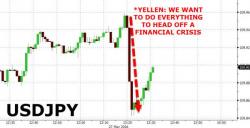Yellen Says Fed's Crisis-Management "Nothing Short Of Magnificent"; Admits Missing Housing Bubble - Live Feed

Dove, hawk, or nothing at all? That's the question as Fed chief Janet Yellen speaks after she receives the Radcliffe Medal from Harvard University's Radcliffe Institute for Advanced Study. There are no prepared remarks, but a scheduled 30-minute Q&A session with Greg Mankiw could give insight into Yellen's thoughts on two key issues: whether she now has more faith that recent evidence of rising inflation is convincing, and the degree to which she feels overseas risks have receded.

